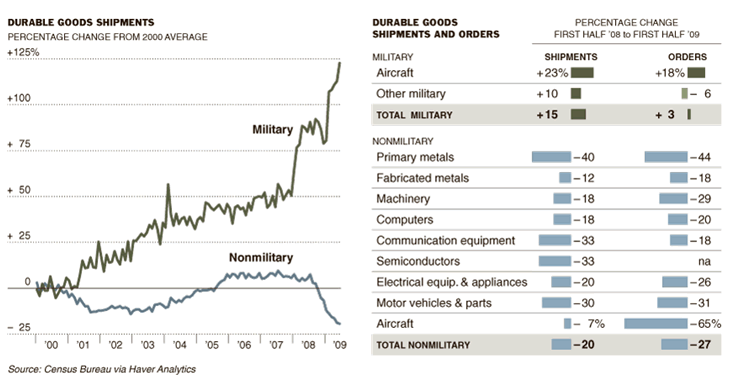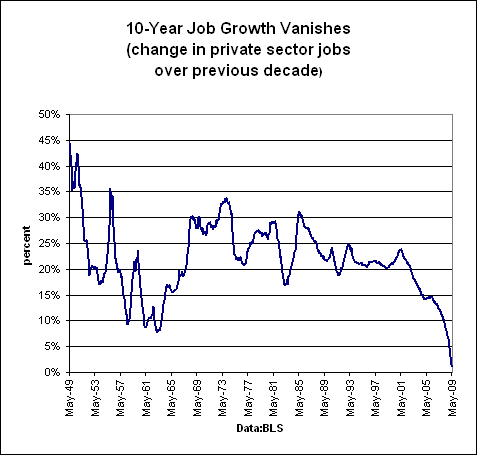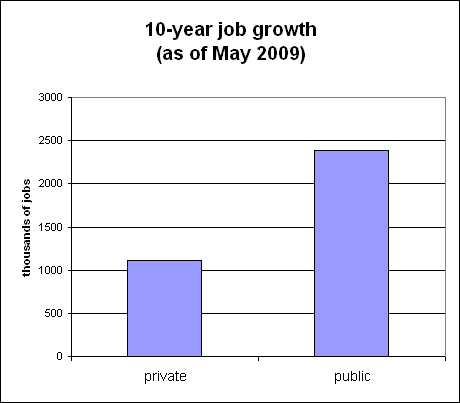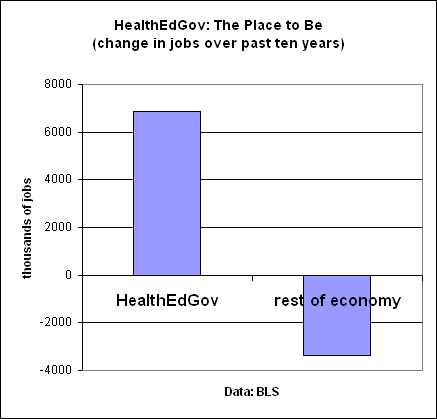Debt is Main Threat to U.S. National Security ... Pentagon Must Cut Spending
Politics / US Debt Aug 29, 2010 - 06:40 AM GMTBy: Washingtons_Blog
 War and The Economic Crisis: Mullen - In February 2009, the head of U.S. intelligence - Dennis Blair - said that the global financial crisis was the largest threat to America's national security. All of America's intelligence agencies apparently agreed.
War and The Economic Crisis: Mullen - In February 2009, the head of U.S. intelligence - Dennis Blair - said that the global financial crisis was the largest threat to America's national security. All of America's intelligence agencies apparently agreed.
The same month, the chairman of the Joint Chiefs of Staff - Admiral Mullen - also agreed.
Now, Mullen is focusing on a specific economic threat. Specifically, Mullen is focusing on the debt:
The national debt is the single biggest threat to national security, according to Adm. Mike Mullen, chairman of the Joint Chiefs of Staff. Tax payers will be paying around $600 billion in interest on the national debt by 2012, the chairman told students and local leaders in Detroit.
“That’s one year’s worth of defense budget,” he said, adding that the Pentagon needs to cut back on spending.
But at least war is good for the economy, right? At least spending on defense will help the economy recover and climb out of this pit of debt. no?
Actually, no.
Nobel-prize winning economist Joseph Stiglitz has said that war can be very bad for the economy. For example, in 2003, Stiglitz wrote:
War is widely thought to be linked to economic good times. The second world war is often said to have brought the world out of depression, and war has since enhanced its reputation as a spur to economic growth. Some even suggest that capitalism needs wars, that without them, recession would always lurk on the horizon.
Today, we know that this is nonsense. The 1990s boom showed that peace is economically far better than war. The Gulf war of 1991 demonstrated that wars can actually be bad for an economy.
Stiglitz has said that this decade's Iraq war has been very bad for the economy. See this, this and this.
And as the New Republic noted last year:
Conservative Harvard economist Robert Barro has argued that increased military spending during WWII actually depressed other parts of the economy.
Also from the right, Robert Higgs has done good work showing that military spending wasn't the primary source of the recovery and that GDP growth during WWII has been "greatly exaggerated."
And from the left, Larry Summers and Brad Delong argued back in 1988 that "five-sixths of the decline in output relative to the trend that occurred during the Depression had been made up before 1942."
As I noted in January:
All of the spending on unnecessary wars adds up.
The U.S. is adding trillions to its debt burden to finance its multiple wars in Iraq, Afghanistan, Yemen, etc.
Two top American economists - Carmen Reinhart and Kenneth Rogoff - show that the more indebted a country is, with a government debt/GDP ratio of 0.9, and external debt/GDP of 0.6 being critical thresholds, the more GDP growth drops materially.
Specifically, Reinhart and Rogoff write:
The relationship between government debt and real GDP growth is weak for debt/GDP ratios below a threshold of 90 percent of GDP. Above 90 percent, median growth rates fall by one percent, and average growth falls considerably more. We find that the threshold for public debt is similar in advanced and emerging economies...
Indeed, it should be obvious to anyone who looks at the issue that deficits do matter.
A PhD economist told me:
War always causes recession. Well, if it is a very short war, then it may stimulate the economy in the short-run. But if there is not a quick victory and it drags on, then wars always put the nation waging war into a recession and hurt its economy.
You know about America's unemployment problem. You may have even heard that the U.S. may very well have suffered a permanent destruction of jobs.
But did you know that the defense employment sector is booming?
As I pointed out in August, public sector spending - and mainly defense spending - has accounted for virtually all of the new job creation in the past 10 years:The U.S. has largely been financing job creation for ten years. Specifically, as the chief economist for BusinessWeek, Michael Mandel, points out, public spending has accounted for virtually all new job creation in the past 10 years:
Private sector job growth was almost non-existent over the past ten years. Take a look at this horrifying chart:
Between May 1999 and May 2009, employment in the private sector sector only rose by 1.1%, by far the lowest 10-year increase in the post-depression period.
It’s impossible to overstate how bad this is. Basically speaking, the private sector job machine has almost completely stalled over the past ten years. Take a look at this chart:
Over the past 10 years, the private sector has generated roughly 1.1 million additional jobs, or about 100K per year. The public sector created about 2.4 million jobs.
But even that gives the private sector too much credit. Remember that the private sector includes health care, social assistance, and education, all areas which receive a lot of government support.
***
Most of the industries which had positive job growth over the past ten years were in the HealthEdGov sector. In fact, financial job growth was nearly nonexistent once we take out the health insurers.
Let me finish with a final chart.
Without a decade of growing government support from rising health and education spending and soaring budget deficits, the labor market would have been flat on its back.
Indeed, Robert Reich lamented this month:
America’s biggest — and only major — jobs program is the U.S. military.
Back to my January essay:
Raw Story argues that the U.S. is building a largely military economy:
The use of the military-industrial complex as a quick, if dubious, way of jump-starting the economy is nothing new, but what is amazing is the divergence between the military economy and the civilian economy, as shown by this New York Times chart.
In the past nine years, non-industrial production in the US has declined by some 19 percent. It took about four years for manufacturing to return to levels seen before the 2001 recession -- and all those gains were wiped out in the current recession.
By contrast, military manufacturing is now 123 percent greater than it was in 2000 -- it has more than doubled while the rest of the manufacturing sector has been shrinking...
It's important to note the trajectory -- the military economy is nearly three times as large, proportionally to the rest of the economy, as it was at the beginning of the Bush administration. And it is the only manufacturing sector showing any growth. Extrapolate that trend, and what do you get?
The change in leadership in Washington does not appear to be abating that trend...[121]So most of the job creation has been by the public sector. But because the job creation has been financed with loans from China and private banks, trillions in unnecessary interest charges have been incurred by the U.S.And this shows military versus non-military durable goods shipments:

So we're running up our debt (which will eventually decrease economic growth), but the only jobs we're creating are military and other public sector jobs.
PhD economist Dean Baker points out that America's massive military spending on unnecessary and unpopular wars lowers economic growth and increases unemployment:
Defense spending means that the government is pulling away resources from the uses determined by the market and instead using them to buy weapons and supplies and to pay for soldiers and other military personnel. In standard economic models, defense spending is a direct drain on the economy, reducing efficiency, slowing growth and costing jobs.
A few years ago, the Center for Economic and Policy Research commissioned Global Insight, one of the leading economic modeling firms, to project the impact of a sustained increase in defense spending equal to 1.0 percentage point of GDP. This was roughly equal to the cost of the Iraq War.
Global Insight’s model projected that after 20 years the economy would be about 0.6 percentage points smaller as a result of the additional defense spending. Slower growth would imply a loss of almost 700,000 jobs compared to a situation in which defense spending had not been increased. Construction and manufacturing were especially big job losers in the projections, losing 210,000 and 90,000 jobs, respectively.
The scenario we asked Global Insight [recognized as the most consistently accurate forecasting company in the world] to model turned out to have vastly underestimated the increase in defense spending associated with current policy. In the most recent quarter, defense spending was equal to 5.6 percent of GDP. By comparison, before the September 11th attacks, the Congressional Budget Office projected that defense spending in 2009 would be equal to just 2.4 percent of GDP. Our post-September 11th build-up was equal to 3.2 percentage points of GDP compared to the pre-attack baseline. This means that the Global Insight projections of job loss are far too low...
The projected job loss from this increase in defense spending would be close to 2 million. In other words, the standard economic models that project job loss from efforts to stem global warming also project that the increase in defense spending since 2000 will cost the economy close to 2 million jobs in the long run.The Political Economy Research Institute at the University of Massachusetts, Amherst has also shown that non-military spending creates more jobs than military spending.
So we're running up our debt - which will eventually decrease economic growth - and creating many fewer jobs than if we spent the money on non-military purposes.
As I wrote last month:
It is ironic that America's huge military spending is what made us an empire ... but our huge military is what is bankrupting us ... thus destroying our status as an empire.
Even Admiral Mullen seems to agree:
The Pentagon needs to cut back on spending.
“We’re going to have to do that if it’s going to survive at all,” Mullen said, “and do it in a way that is predictable.”
Global Research Articles by Washington's Blog
© Copyright Washingtons Blog, Global Research, 2010
Disclaimer: The views expressed in this article are the sole responsibility of the author and do not necessarily reflect those of the Centre for Research on Globalization. The contents of this article are of sole responsibility of the author(s). The Centre for Research on Globalization will not be responsible or liable for any inaccurate or incorrect statements contained in this article.
© 2005-2022 http://www.MarketOracle.co.uk - The Market Oracle is a FREE Daily Financial Markets Analysis & Forecasting online publication.






